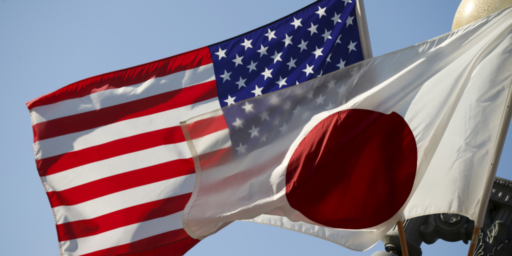IF IT’S GOOD ENOUGH FOR TEXAS. . .
Matthew Yglesias proposes an amusing solution for the problem caused by having a Shi’a majority in Iraq:
It does seem, however, like a fear that could be partially alleviated through the creative use of the good old American tradition of gerrymandering. Clearly, Sistani and whoever’s around him are sophisticated enough to know the difference between a proper election and a complicated indirect caucus process, but the administration has at its disposal a large (bipartisan) group of people who know a lot more about drawing electoral boundaries than anyone in Iraq. The odds that a certain amount of wool could be pulled over Sistani et. al.’s eyes strikes me as pretty good.
I’d think it more complicated than simply drawing districts. It seems to me that it’s a systemic problem. If we could write a constitution for them, as we did for Japan and Germany, and impose strong federalism and significant checks and balances, a bill of rights, and a supermajority requirement for constitutional amendment, then we might have a shot at this thing working out. Granted, we’d have to soft soap this one to give it an air of legitimacy. Words like “impose” couldn’t be used and, indeed, an Iraqi council would have to be nominally in charge of the drafting process. But, again, we did this with Germany and Japan and, while we have policy disputes with both states from time to time, I can’t recall much complaining about the constitutions we gave them.
A unitary system with unity of powers would lead to Shi’a rule regardless of how the district lines are drawn, presuming that something like one man, one vote is observed. The majority rules in such a system and change comes very quickly, since the will of the electorate is largely unchecked.
While political culture and history are both important variables–Iraq is neither Germany nor Japan, obviously–institutions matter a great deal. They create a set of ground rules by which the game is played. Federalism would give the Kurds and Sunnis substantial autonomy and checks and balances and a bill of rights would give the minority some breathing room. It would be virtually impossible to impose religious rule over such a state, too. That’s not to say that the Shi’a majority and the basic tenets of Sharia law wouldn’t influence the political culture and shape legislation. It would; just as the Christian majority shapes ours. But we’d make it much harder for them to go off the deep end and wind up in a civil war.



